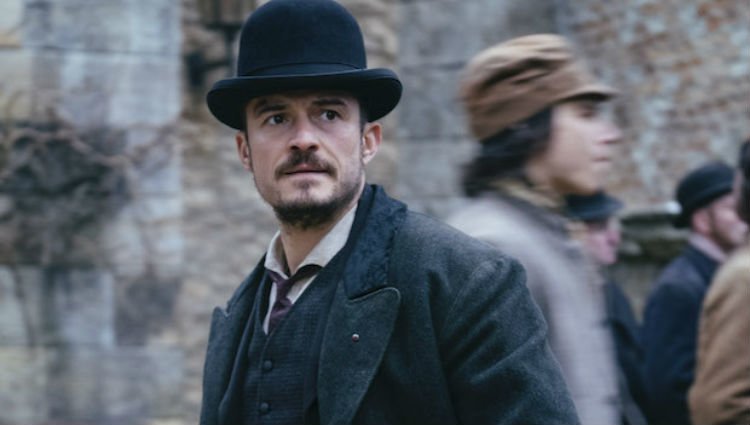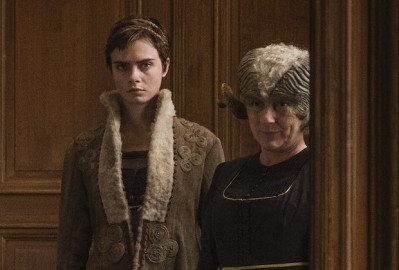
“Sometimes the old wounds hurt the most.”
It’s labor day weekend and what better way to spend that time (other than with family, of course) than a solid fantasy binge. With Netflix’s Dark Crystal: Age of Resistance being a much anticipated journey into the nostalgia of the original movie, Carnival Row is Amazon Prime’s own attempt at building a world worth remembering. It’s premiere episode, “Some Dark God Wakes”, though unable to shed the familiar issues shared by many pilot episodes tasked with establishing a massive world and also burdened with cringe-worthy tropes on class, immigration, and prejudice, showcases a solid cast and hints at surprises lurking in the dark that may take Carnival Row beyond the initial nature of this narrative where the downtrodden lie blameless for their circumstance.
Using text and visual stills, Carnival Row gives a short and frankly lazy Cliff Notes of the history between the Fae and the humans of the Burgue. Granted, with seven episodes of content remaining, this intro may be to just whet viewers’ appetites for more. The problem is that, for much of the episode, the conversations between characters where this war the Fae, the Pact, and other very important aspects of this world’s history are mentioned fall a bit flat due to the poorly orchestrated introductory blurb. Couple that with the complete lack of subtlety in presenting the Fae/human relations, and it seemed that the promising concept would be wasted on eye-rolling tropes and shoddy storytelling.
Though this still may be the case, two characters saved me from losing interest in the series much too early and it just so happens that these two are the most important pieces of Carnival Row.

Vignette Stonemoss (Cara Delevingne, Paper Towns, Suicide Squad) is the first to appear, flying into action moments after the introduction, doing her best to rescue her fellow Fae from what later is hinted to be a horrible camp for women and children (they don’t give details, but the suggestion is clear). Vignette fails in her efforts and, after being the sole survivor of a shipwreck, finds herself in the Republic of Burgue. She quickly falls into the indentured servitude of Imogen (Tazmin Merchant, Supergirl, Salem) and Ezra Spurnrose (Andrew Gower, Outlander, Being Human) and, through her eyes, we get a better look into this world of the haves and have-nots, a city that is the portrait of so many other stories of injustice. This is both good and bad for the drama: considering our world history, it’s a relatable tale, one just as real if the Fae were replaced by any ethnic group. Yet, that also leads to the bad; it’s a failing other forays into this genre have had—think the Will Smith Netflix film, Bright—where there doesn’t seem to be a genuine attempt at exploring these prejudices in a unique and subtle way. Granted, with only one episode in the bag, some of these complaints may be alleviated but, as a standalone episode, this particular part of “Some Dark God Wakes” comes up short.
Orlando Bloom (Lord of the Rings, Black Hawk Down) is the second bright spot in Carnival Row’s premiere. As Constable Rycroft Philostrate, Philo for short, he’s the consummate good man, treating the Fae with the respect every sentient being deserves. His current case has him tracking down Unseelie Jack, an unknown man whose racial attacks have the Fae community fearing for their safety and furthering the divide between their world and those of the humans. Thanks to a cooperative victim and a good bit of luck, Philo tracks down the criminal and Unseelie Jack delivers a chilling (albeit hammy)monologue that hints at the horrors to come. Horrors present in their city thanks to the Fae’s migration from their ancestral home. His cryptic words give promise to Carnival Row’s first season, promise that this will be more than just a dialogue on inequality and the liberties taken by the victors in any war. This optimism is further enhanced by Philo and Vignette’s past relationship and the tangible heartache between the pair in their one scene together. Bloom and Delevingne have a decent chemistry and discovering more about their relationship as the world around them threatens to fall into darkness should be enough to make even the most skeptical viewer tune in for a few more hours.
Though failing to meet my initial expectations, “Some Dark God Wakes” is a solid but flawed first dip into Carnival Row’s ocean of mythology, providing two extremely captivating characters and enough mystery to shake up the formulaic approach of class and societal injustices.
Fae, Love, and Hope
- As mentioned above, other than Philo and Vignette—and the brief glimpse of David Gyasi (Cloud Atlas, Troy: Fall of a City, Containment) as Argeus Astrayon— no other character really came to life onscreen. Imogen and her brother seemed the typical period piece socialites, while the others, human and Fae alike, came off as one-dimensional NPCs. Even Jared Harris’s Absalom Breakspear and his political battle to remain chancellor carried no depth. But there is hope; Carnival Row possesses enough capable actors that, if given time and good writing, will flesh out their characters and this brave new world.
- Even in the less than impressive way the series has thus far handled the backstory of this world, it does create a lot of questions. While the setting is something one would see in Victorian England, Imogen’s mention that “this is the 7th century” threw my own expected timeline out of whack. More than anything though, I need to know more about this war between the Fae and humans, in addition to whether or not that these conditions are mirrored throughout the country or world…or is this Republic of Burgue the only place the Fae truly suffer? This may be too large an expanse of the story mythos for this 8-episode first season, better left to be explored in the already greenlit season 2.
- Philo’s decision to fake his death and leave Vignette in mourning will be a major obstacle for the pair to navigate through. Her reaction—holding a knife to his throat—may have been a bit overly dramatic but her anger and pain is understandable. It probably won’t help then, when she discovers Philo has taken another lover in the widowed Portia Fyfe (Maeve Dermody, The Frankenstein Chronicles, Marcella). I expect at least a handful of flashbacks to flesh out their relationship in the backdrop of this generation-defining war.
